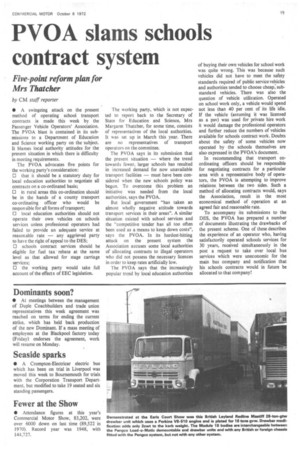PVOA slams schools contract system
Page 21

If you've noticed an error in this article please click here to report it so we can fix it.
Five-point reform plan for Mrs Thatcher
by CM staff reporter
• A swingeing attack on the present method of operating school transport contracts is made this week by the Passenger Vehicle Operators' Association. The PVOA blast is contained in its submissions to a Department of Education and Science working party on the 'subject. It blames local authority attitudes for the present situation in which there is difficulty in meeting requirements.
The PVOA advocates five points for the working party's consideration: El that it should be a statutory duty for local education authorities to negotiate all contracts on a co-ordinated basis; E in rural areas this co-ordination should be in the hands of a county transport co-ordinating officer who would be responsible for all forms of transport; ▪ local education authorities should not operate their own vehicles on schools services unless professional operators had failed to provide an adequate service at reasonable rate — any aggrieved party to have the right of appeal to the DES; O schools contract services should be eligible for fuel tax rebate at the same level as that allowed for stage carriage services; ▪ the working party would take full account of the effects of EEC legislation.
The working party, which is not expected to report back to the Secretary of State for Education and Science, Mrs Margaret Thatcher, for some time, consists of representatives of the local authorities. It was set up in March this year. There are no representatives of transport operators on the committee.
The PVOA says in its submission that the present situation — where the trend towards fewer, larger schools has resulted in increased demand for now unavailable transport facilities — must have been considered when the new schools policy was begun. To overcome this problem an initiative was needed from the local authorities, says the PVOA.
But local government "has taken an almost wholly negative attitude towards transport services in their areas". A similar situation existed with school services and the "competitive tender has all too often been used as a means to keep down costs", says the PVOA. In its hardest-hitting attack on the present system the Association accuses some local authorities of allocating contracts to illegal operators who dici not possess the necessary licences in order to keep rates artificially low.
The PVOA says that the increasingly popular trend by local education authorities of buying their own vehicles for school work was quite wrong. This was because such vehicles did not have to meet the safety standards required of public service vehicles and authorities tended to choose cheap, substandard vehicles. There was also the question of vehicle utilization. Operated on school work only, a vehicle would spend not less than 40 per cent of its life idle. If the vehicle (assuming it was licensed as a psv) was used for private hire work it would damage the professional operators and further reduce the numbers of vehicles available for schools contract work. Doubts about the safety of some vehicles now operated by the schools themselves are also expressed in the PVIDA's document.
In recommending that transport coordinating officers should be responsible for negotiating contracts for a particular area with a representative body of operators, the PVOA is attempting to improve relations between the two sides. Such a method of allocating contracts would, says the Association, result in the most economical method of operation at an agreed fair and reasonable rate.
To accompany its submissions to the DES, the PVOA has prepared a number of documents illustrating the drawbacks of the present scheme. One of these describes the experience of an operator who, having satisfactorily operated schools services for 30 years, received simultaneously in the post a request to take over local bus services which were uneconomic for the main bus company and notification that his schools contracts would in future be allocated to that company!






































































































